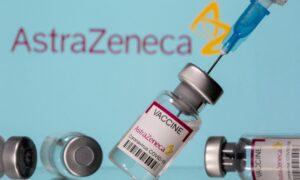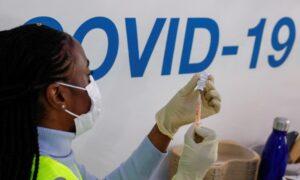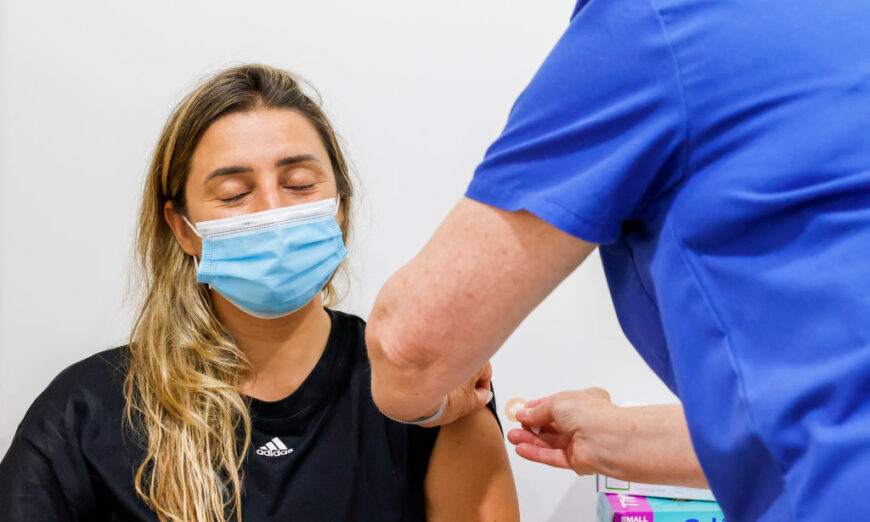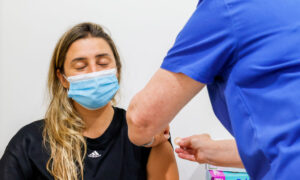Actress Sues AstraZeneca After COVID-19 Jab Leaves Her With Brain Injuries
Melle Stewart was a hugely successful actress. Now she has a piece of titanium the size of her hand lodged in her skull.
An Australian theatre star and vaccination advocate is suing pharmaceutical company AstraZeneca, claiming that a life-threatening stroke left her unable to work after taking the company’s vaccine.
Melle Stewart, 42, is known for her acting in both the UK and Australia, including playing the lead in the musical Mamma Mia! and Channel 7’s Home and Away.
Ms. Stewart received her first dose of the AstraZeneca COVID-19 vaccine on May 24, 2021.
Two weeks later, she began having seizures, lost her ability to speak, and lost all movement on the right-hand side of her body.
Brain surgeons diagnosed her with Vaccine-Induced Thrombocytopenic Thrombosis (VITT), a blood-clotting condition that the manufacturer and the regulators now acknowledge as a “very rare side effect” of this particular vaccine.
She underwent multiple procedures and rigorous therapy, including craniectomy, a three-hour operation to remove a portion of her skull to reduce the pressure in her brain and keep her alive.
Surgeons have since replaced that part of her skull with a titanium plate the size of her hand.
‘Linked to the Vaccine’
From the start, the doctors “were running the hypothesis that this was linked to the vaccine,” said Ms. Stewart’s husband, Ben Lewis.
“It was a relatively new diagnosis. But Melle had zero medical history. She was so healthy. She looked after her body like a temple. After all that was her job. She had never even been in hospital before,” he said.
Despite this, blood tests conducted by a haematologist revealed specific markers to confirm the vaccine as the cause.
Ms. Stewart exhibited low blood platelet levels and clotting issues, necessitating five blood transfusions within four days.
The couple had never had COVID-19 to their knowledge, but the theatre industry had been shut down during the pandemic, so they believed that mass vaccination was a crucial step in bringing back audiences.
“I am grieving over it. It is hard.”
While she received £120,000 (A$230,000) from the government as an acknowledgement of the vaccine’s damage, it falls short of compensating the substantial earnings lost by her and her husband, who put his work on pause to nurse his wife back to health.
Ms. Stewart has agreed to a second vaccination and wants people to know that she remains an advocate for vaccination.
However, the pair are compelled to take legal action against AstraZeneca because they believe they were misled by the government’s reassurances.
“We had an expectation this vaccine was safe to use but AstraZeneca was not safe to use in this case,” Mr. Lewis said.
“And while there are only a relatively small number of people injured or worse, it is incumbent on the government to take care of the very few people who have done the right thing for the country and society.”
Vaccine Damage Payment
Ms. Stewart’s tax-free payment from the government is part of a compensation scheme set up in 1979 to maintain public confidence in all vaccinations.
For people who have suffered life-changing injuries from having a COVID-19 vaccination, and the flow-on impacts on their loved ones, critics consider this to be woefully inadequate.
The present payout amount has not been raised since 2007.
“Our sympathy goes out to anyone who has lost loved ones or reported health problems,” he said.
The spokesperson added that the government’s Medicines and Healthcare Products Regulatory Authority (MHRA) granted full marketing approval for Vaxzevria for the UK based on the “safety profile and efficacy” of the vaccine.
This article has been archived for your research. The original version from Epoch Times can be found here.






